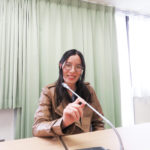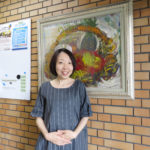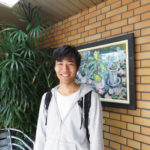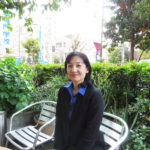Characteristics of Japanese-Chinese Interpretation and Translation Department
-
1. Well-balanced educational content and a variety of elective courses as well as a full range of special courses
2. Students will strengthen their Japanese ability and acquire skills to translate and interpret. They can learn about culture and business too.
-
3. Chinese course students (beginner and intermediate)
4. Even complete beginners can learn the basics solidly, so be reassured. Instructors who can educate for many levels of ability will support students. They will instruct the students until they understand and internalize the knowledge, without leaving anything unclear.
-
5. Interpretation Course Students (Interpretation) Interpreting Preparation C, Interpreting Education Advancement C, Interpreting and Translation I, Interpreting and Translation III
6. Students will form a solid foundation for their future by thoroughly polishing their skills in interpretation and translation from the basics to advanced levels. We have produced many Chinese study-abroad students and Japanese students who have passed (National Interpreter Guide Exam: Chinese Language). Shurin can give you a unique and easily-understood points so that students can conquer their weak points.
-
Support for job hunting well
Faculty of employment guidance conducted how to write resume and guidance on interview. Individual counseling can be done at any time. We also invite the outside person as a special lecturer and hold employment seminars. For job hunting activities, industry research is important. (Interpretation, translation, trade, sales, clerical, etc) Do not know Do let your teacher know more and more and decide your career. In Shurin, elective courses (businesses such as trade, IT, business) that acquire business skills are also substantial, let’s achieve your goal with a certain language skill + α!
-
9. A top-level group of instructors including veteran professional interpreters and young instructors on the cutting-edge of their field using practical traditional methods and the latest methods
10. In the AM, students will take all of the special courses (from Chinese, Interpretation and Translation Basics to Interpretation practice, which relates to real work). In the PM, students take elective courses (National Interpreter Guide Exam, The Proficiency Test in Trading Business, Information Processing, TOEIC, and Business Examination preparation). They will gain practical skills by leveraging the latest interpretation practice equipment and computer equipment.
-
Classes outside of the school
12. Taking advantage of the Japanese they have learned on a daily basis at barbeques, onsen trips, theme parks, sports competitions, gyoza parties, and speech competitions, students will deepen ties to their schoolmates and surely make pleasant memories of studying abroad.
-
The Scholarship System at Shurin has a wide range of awards
14. Shurin provides a scholarship system with a wide range of awards to reward students’ motivation. Scholarship System: Founder Kim Hee Su Scholarship, Entrance Examination By Commendation Scholarship, Scholarship Entrance Examination Scholarship, Chairman’s Scholarship, President’s Scholarship, Shurin Scholarship, Merit Scholarship, Perfect Attendance Scholarship, Diligence Scholarship.
Comments from Students

XU MINGYUAN(from Beijing, China)
Study-abroad students’ worries vanish! You have the support system they promise!
When I entered Shurin and started studying abroad, it was exactly how I thought it would be. Teachers were strict and taught us well and listened to our worries as well, so I never feel homesick. This is a school you can attend reassured.

LOH WAIMING(From Hong Kong, China)
I want to be a trilingual: Chinese, Japanese, Chinese international translator and interpreter!!
I worked as a Japanese teacher in Hong Kong while translating between Chinese and English. In order to build my work skills, I started studying interpreting and translation in Tokyo.
Shurin values the practicality of curriculum, and in addition to interpreting and translation, you learn Japanese history, culture and geography, business, and for the Guide test for a wide variety of fields.
In the future, I want to become an international person who is trilingual in Chinese, Japanese and English and continue translation and interpretation for the rest of my life.

ZHU YONGLIN(From China / Hubei Province)
A variety of classes and rich menu of events!
It has been a year since I came to Hubei. In this year, I have of course learned translation and interpreting, but also I have learned Japanese history and geography as well as common knowledge in my classes here. I was able to create a solid base for future work and education here.
In addition to English and Korean, I learned in elective courses ranging widely, including computer and trade. Further, I made some important memories for me in classes outside the school, such as traveling to an Onsen and the speech competition.

JULAITI HASIMU(From Xinjiang Uyghur Autonomous Region, China)
I had a fulfilled and meaningful student life!
When I look back at my year at Shurin, I remember many experiences including the sports competition where we got sweaty and passionate, the speech competition where we competed to win, and more. I spent a very meaningful year here, one day at a time. I also have fun memories of going to the onsen for learning outside of school and experiencing a Yukata for the first time and entering the onsen with my classmates.
Interpreting and Translation Course
- We use the direct method. In addition to fostering a high-level of language ability, we deepen understanding of the history and culture between Japan and China to raise interpreters and translators who will contribute to economic exchange between the two countries.
- Complete with National Interpreter Guide Exam with thorough instruction
- Students will gain real skills fit for the actual work environment while gathering the latest information and learning about language, culture, literature and current affairs.
1 Year
Students will acquire skills beyond the basic skills of interpreting and translation. In addition, students will seriously learn about the society and culture behind them.
2 Year
Each student will learn about the special courses that directly connect to their desired career path and they will polish their interpreting and translation skills even further.
- Tourism
- Mass media
- Simultaneous interpreting
- National Interpreter Guide Exam
- Business
Curriculum
| Special Course | Japanese-Chinese Interpreting And Translation Overview, Japanese-Chinese Grammar For Interpreting I, General Interpreting Practice 1, Chinese-Japanese Interpreting I, Chinese-Japanese Translation I, Japanese-Chinese Interpreting I, Japanese-Chinese Translation I, Interpreting, Business Interpreting And Translation I, Consecutive Interpreting, Video Translation I |
|---|---|
| Elective Course | National Interpreter Guide Exam Preparation, Computer, Business Japanese Proficiency Test Preparation, The Proficiency Test in Trading Business Preparation, Business Examination Etc. |
●Video Translation
●Literature Translation
●Business Document Translation Etc.,
For A Variety Of Special Courses
| Special Course | |
|---|---|
| Elective Course | National Interpreter Guide Exam Preparation, Information Processing, The Proficiency Test in Trading Business Preparation, Business Examination Etc. |
Path forward after graduation
■Job-hunting…Interpretation and translation company, publisher, travel agency, hotel, movie company, airline, trading company, etc.
■Working as a freelance
■Further education
Message from the Instructors

Lead of Japanese-Chinese Interpreting and Translation Department
Instructor Youko Yamazaki
Graduate of Tokyo University of Foreign Studies / Faculty of Foreign Studies, Chinese Studies
Long ago, people use to think that the earth is the center of the galaxy, but then they learned the theory that the earth revolves around the sun and were able to learn the true state of the galaxy. To learn another language and culture is to separate oneself from the “galaxy centered around oneself” and show oneself a new world.
Main Course Contents
| Course | Course Contents |
|---|---|
| Japanese-Chinese and Chinese-Japanese Literature Translation | By focusing on literature critique, essay and novels, students learn how the method to translate in which you can recreate the nuance of words and content of the work. |
| Japanese-Chinese Current Affairs Translation | Using Japan’s newspaper articles and opinion pieces, students will read and then translate them into the appropriate Chinese. |
| Japanese-Chinese Translation Basics | Everyday information, society, economy, culture are covered in this course.日Students will focus on grammar and vocabulary to practically learn the basics of translation. |
| Japanese-Chinese Interpreting Practice | Students will practice interpreting of conversation that occurs in everyday life as well as in daily news. |
| Japanese-Chinese and Chinese-Japanese Interpreting Practice | Using news articles as material, students will crosscheck with terminology used in current affairs and practice consecutive interpreting. They will also practice simultaneous Japanese-Chinese interpreting. |
| Chinese-Japanese Translation Practice | Upon gaining basic knowledge of translation basics, students will translate a short, simple passage from Chinese to Japanese. In addition they will aim to strengthen their knowledge of particles and conjunctions in Japanese. |
| Japanese-Chinese interpreting Practice | Introducing a recently developed method to improve interpreting skills, students will polish their interpreting skills. A range of elements required by Japanese society are woven in to the course, such as skills one must acquire to work at the front line of the Japanese-Chinese market. |
| Advanced Japanese | Through strengthening of vocabulary and reading comprehension of newspaper articles, developing Japanese ability to discuss current affairs issues with Japanese people |
| Business interpreting and translation | Words necessary in the business scene are learned in common documents through translation practice. The system of Japanese companies, their take on work are also incorporated in the curriculum. |
| National Interpreter Guide Exam Preparation | Mainly referencing the National Interpreter Guide Exam questions, students will study to prepare for passing the exam. |
Schedule *PM is elective courses.
| Class | Monday | Tuesday | Wednesday | Thursday | Friday | |
|---|---|---|---|---|---|---|
| 19:00-10:30 | 1 Year | Interpreting PracticeⅠ(Chinese-Japanese) | Translation BasicsⅠ(Japanese-Chinese ) | National Interpreter Guide Exam PreparationⅠ | Current Affairs Translation Ⅰ | |
| 2 Year | Advanced Japanese 2 | Translation Practice II(Chinese-Japanese) | Simultaneous Interpreting II(Japanese-Chinese ) | Literature Translation II(Chinese-Japanese) | Interpreting Practice II(Japanese-Chinese ) | |
| 210:40-12:10 | 1 Year | Advanced Japanese 1 | Translation PracticeⅠ(Chinese-Japanese) | Interpreting Ⅰ | Literature Translation Ⅰ(Chinese-Japanese) | Interpreting PracticeⅠ(Japanese-Chinese ) |
| 2 Year | Literature Translation Ⅲ(Japanese-Chinese ) | Interpreting Practice II (Chinese-Japanese) | Translation Basics II (Chinese-Japanese) | National Interpreter Guide Exam II | Current Affairs Translation II | |
| Lunch Break | ||||||
| 313:00-14:30 | 1 Year | JLPT Preparation | National Interpreter Guide Exam Preparation Ⅰ | Trade ProfessionalⅠ | Information ProcessingⅠ | Japanese History |
| 2 Year | Interpreting II | Common Knowledge | ||||
| 414:40-16:10 | 1 Year | Business Examination | National Interpreter Guide Exam Preparation II | Trade Professional II | Japanese Geography | |
| 2 Year | Trade Professional II | Information Processing II | ||||







